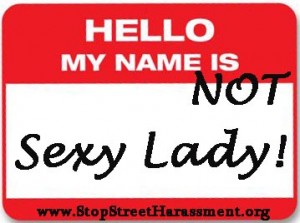 It’s the first day of the 16 Days of Activism Against Gender Violence and on this blog you can read one name a day that women do NOT want to be called by men they do not know when they’re in public places. All 16 names were submitted via Twitter or Facebook.
It’s the first day of the 16 Days of Activism Against Gender Violence and on this blog you can read one name a day that women do NOT want to be called by men they do not know when they’re in public places. All 16 names were submitted via Twitter or Facebook.
What’s the connection between a name and gender violence?
Well, men calling women they don’t know “legs,” “baby,” or “pussy,” is behavior at one end of the spectrum of gender violence, with rape and murder at the other end.
Gender violence occurs because women are disrespected, seen as less than men, and are dehumanized and sexually objectified. A sad consequence of this gender imbalance is that countless men harass, beat, rape, assault, and murder girls and women around the world: inside homes and huts, at schools and workplaces, and in war zones and public places.
One way to create and perpetuate disrespect for women is for men to call women they do not know inappropriate, sexualized, degrading, and humiliating names in public places. Instead of respectful titles like, “Ma’am,’ or “Miss,” or instead of simply not addressing strange women on the streets, period, women are called names that mark them as less than.
If we speak out and say, “Calling us these names is NOT okay,” then that takes us one step closer to changing a culture where gender violence happens.
Don’t let harassers off the hook: respond | report | share your story.



